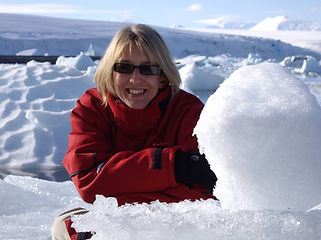COLLABORATIONS

ABX and The British Antarctic Survey (BAS)
by Professor Melody Clark, Project Leader at The BAS
With all of todays emphasis on networking (even in our Covid-restricted world), you just have to accept that your best collaborations often happen by accident. I have a long-standing research interest in understanding how Antarctic marine species have adapted to life in the freezing Southern Ocean and was coming round to the idea that, maybe the microbiome might play a role in this and maybe I should delve a bit more into the world of bugs? So, the invite for the inaugural meeting of the ABX network at the Eden Project came at exactly the right time. Admittedly, the venue was a big plus, as I had always wanted to visit the Eden Project and I managed to organise the whole trip to include three other meetings in the South West and a trip to Tate St Ives and the Hepworth Museum: Result!
In terms of understanding antimicrobial resistance (AMR) and identifying antimicrobial compounds, the Antarctic data are sparse. There are a few ad hoc studies showing that AMR is present in Antarctica and that novel antimicrobials can be found in the endemic fauna, but no real systematic studies. Through ABX, I’ve been able to develop two new areas of research for BAS.



Novel antimicrobials studentship: I am very pleased to announce that Kudzai Hwengwere was successful in winning an ARIES DTP PhD on antimicrobial discovery : https://www.aries-dtp.ac.uk/studentships/clark/. The supervisors are Mat Upton and Kerry Howell (Plymouth), Lloyd Peck and myself (BAS) and we are really looking forward to working with Kudzai on this incredibly exciting project.
Kudzai will analyse the microbiome of Antarctic soft-bodied animals such as nudibranchs, anemones, soft corals and sea lemons to characterise their microbial biodiversity and identify potentially novel antimicrobial compounds. After all, these beautiful creatures manage to avoid predation and survive quite happily in freezing seas with very little physical protection and we think their microbiome could be key to this success.
AMR: Antarctica is still a relatively pristine environment, yet AMR has been identified in the seas around the continent. Given the limited human presence on the continent, surveys of the environment around Antarctic research stations present an ideal opportunity to study the early stages of transmission of AMR and the interactions between humans and the endemic fauna: do the animals act as reservoirs or vectors of AMR? This summer we, together with the team of Caray Walker at Anglia Ruskin University (ARU), were awarded a BAS Innovation Impact voucher to screen BAS archival penguin scat samples for the presence of AMR. In addition, ARU Masters student Kudzai Hwengwere (yes, the very same PhD student above!) will use her Masters project to produce a literature review of AMR work in Antarctica and screen published Antarctic metagenomes for potential AMR gene clusters. If Covid restrictions allow her some lab time before she has to submit, she will culture microbes from sediment and scat samples collected around the Rothera UK Antarctic Research Station and assay them for AMR.
So, all in all, a very successful trip to the Eden Project, thanks to ABX. We are obviously looking for more funds to increase the scope of both projects (and yes, we really did travel 330 miles to initiate the ARU collaboration, when Caray’s office is actually 5 minutes away from my home!).
